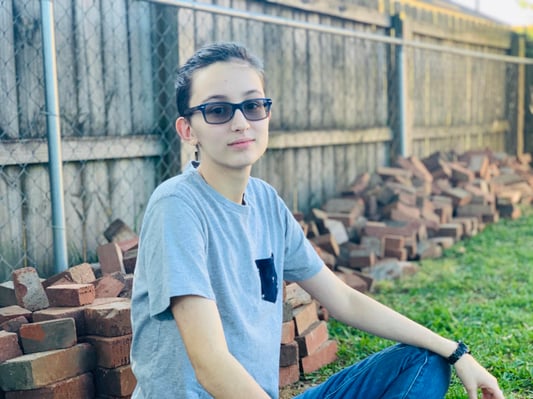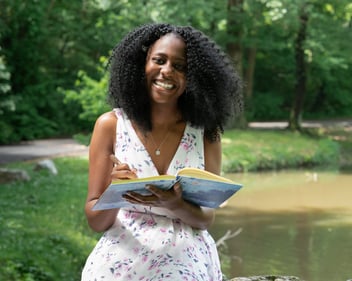When Lee Gaines sat down to write their poem “you will always be from alabama,” they experienced the writer’s dream: the “sentences [fell] out of my head, fully-formed, and arrange[d] themselves on the page.” But as any writer knows, putting words to paper is only a fraction of the writing process. In Lee’s case, the ease with which the sentences flowed was the result of years of hard work, including a deep immersion in poetry, seeking feedback from others, and confronting internal conflicts. And then after the poem was written came the risk of putting it out into the world—one we’re glad they took, as it resulted in a first place win in our Poetry & Spoken Word Competition!
Read on about Lee’s extensive knowledge and deep love of poetry, the challenges they faced in writing this piece, and their encouragement to LGBTQ folks.

Our guest judge Anne-Marie Te Whiu says about your poem: “We understand, inherently, that the ‘you’, is the ‘I’—that the author will always be from Alabama, no matter what.” Can you tell us about your process for deciding to use the second person throughout this poem, rather than the first or third?
Using the second person is always a challenge—and it’s also not used very much, which is a shame, because it’s one of my favorites. “You” is so much more confrontational than “I.” “You” pulls, well, you, into the work, because the work is speaking directly to you. It can be inviting, or demanding, and I’ve found it’s much more engaging than any other point of view. But it’s like pepper, too—use it too much and it’s all you can see. It’s a difficult balance to strike, but I love it and use it often.
What has your journey as a poet been like to get you to this point where, as Anne-Marie Te Whiu says, you are able to tackle big topics with poetic skill and powerful language?
Poetry wasn’t accessible to me until my freshman year of high school. It was taught in English class, and we went over basic poetic structure and some poems by well-known poets in middle school creative writing (Langston Hughes, Robert Frost, etc.). But it wasn’t until my high school creative writing class that I could even fathom what poetry could do and how it could move people. I remember two specific studies that wowed me the most: first, modernist era poetry, and the emotion it can convey (I recommend T.S. Eliot’s “The Waste Land”) as well as how the form of the poem itself can be manipulated (all of e e cummings’s works do this, but “rpophessagr” is a true masterpiece). The second study was a book of poetry called The Lives of the Poem by Richard Hague. It went through the creative process and delved into the mind of the poet in a way I hadn’t seen before, and many of the poems themselves made me gasp out loud when I finished them. Studying—intentionally or not—other poetry, and finding what moves you, is one of the most important things for a developing poet to do. What made you feel a certain way? how? why? Poetry’s a rather emotional journey as well, so being in tune with your emotions—no small feat—is very important.
What was the biggest challenge you faced in writing this piece?
There were so many challenges writing this piece, I’m not even sure where to start. Gender identity has been an internal conflict of mine for years, and it’s taken me at least four to even be coherent when I try to explain my own. So, getting all the ideas to come together in the first place was huge, though that was mostly subconscious. The writing itself wasn’t difficult; I have these rare moments where sentences fall out of my head, fully-formed, and arrange themselves on the page, but this conversely makes them harder to edit (I’m very grateful to everyone who reviewed my piece—couldn’t have done this without your help.) The final, biggest hurdle was sharing it. This piece is intensely personal—everything in it has actually happened and the people I write about are real people. When you write about real people, you have to be really, really careful what you write about them and how you portray them. So sharing was—is—a risk. And I haven’t shared it with everyone, but everyone who I have shared it with has taken it well. I’m really grateful that I have support in a place that smothers so many LGBT folks. To any of you out there—you are valid and you’re not alone. Things do get better, I promise. It’s worth the wait. You can do this.
Which poets do you admire and would recommend the Write the World community read?
Warning: this is a long list!
- All of the ones I mentioned above: Hughes, Frost, Eliot, cummings, Richard Hague for sure.
- The modernists in general are a strong group—modernism in all types of art has always caught my eye.
- Alan Ginsburg’s work has an absurd, fantastical quality that I’ve wanted to attempt for years now.
- Nick Flynn is wonderful, though he’s contemporary, he reminds me of modernists because of his imagery and subject matter.
- Carolyn Forché’s poems are stories, and I can almost imagine I’m listening to someone tell them, maybe sitting by a fireplace or at a kitchen table in candlelight.
- Ocean Vuong’s poems have this rawness that makes me forget how to breathe halfway through, and I’m left gasping by the time I get to the end.
- Also, not poets, but much of Robert Delong, Absofacto, and Matt Maeson’s lyrics give me the same oh-what-huh-wow-feeling that the above poets do. There are so many more, I could write an entire blog post about them. As a note, though, many of the poets (and musicians) I’ve mentioned do use strong language in their works.





